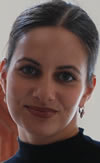Introducing Marietta König
 Marietta König (Berlin, 1979) has studied political science, intercultural business communication, slavistics and caucasiology. She has been a student at Friedrich-Schiller-University Jena (FSU), State University in Minsk, Institut d’Etudes Politiques de Paris and Tbilisi State University. In 2004, Ms König graduated from the FSU with a Masters’ thesis about the OSCE Longterm Mission to Georgia’s work in South Ossetia.
Marietta König (Berlin, 1979) has studied political science, intercultural business communication, slavistics and caucasiology. She has been a student at Friedrich-Schiller-University Jena (FSU), State University in Minsk, Institut d’Etudes Politiques de Paris and Tbilisi State University. In 2004, Ms König graduated from the FSU with a Masters’ thesis about the OSCE Longterm Mission to Georgia’s work in South Ossetia.
She is currently researcher and PhD candidate at the Center for OSCE-Research (CORE) at the Institute for Peace Research and Security Policy at the University of Hamburg (IFSH). Her PhD project is about the UNOMIG Mediation between Georgia and Abkhazia.
In this interview, Ms König gives her view on the achievements of president Saakashvili, the identity of the opposition and the nature of Georgia’s political system. The other part is Marietta König: Georgia – Abkhazia, South Ossetia and conflict resolution.
Interview
What have the policies of president Saakashvili achieved so far?
When Saakashvili was elected president in January 2004, he almost instantly initiated measures for the restoration of Georgia’s territorial integrity, the creation of a modern national defense force, a broad economic growth and investment in education, health care and good governance, and finally the integration into NATO and other European institutions, which was considered to also include constructive relations with all of Georgia’s neighbors.
While some measures were of a quick success (e.g. the reintegration of Ajaria into Georgia’s administration, the fight against corruption, promotion of investment etc.), others took time to show some effect, a factor which the new government was hardly willing to accept.
Right from the start, Saakashvili and its crew were driven to produce quick results in establishing a modern state in Georgia, an equal partner for western allies. This process however, was accelerated in an artificial manner, which often overstrained the Georgian people, and increasingly included questionable measures. Thus, it was not without surprise that the domestic situaion escalated in November 2007, and paved the way for early elections. Saakashvili was reelected. However, the pressure, particularly to restore Georgia’s territorial intergrity, increased.
After the war in August 2008 and an observed re-radicalization of Georgian domestic policy, a lot of progress has been undone again. It remains to be seen what, eventually, will be considered as a success of Saakashvili’s policy.
How strong is the position of Saakashvili?
Despite Saakashvili’s often questionable policy, the support of the Georgian people has always remained high. Particularly its efforts to restore Georgia’s territorial sovereignty have always been supported and also enabled its re-election in January 2008. Interesting to observe is that especially young people in Georgia support Saakasvhili and its policies.
Nevertheless, the number of critics grew stronger. The war between Georgia and Russia in August last year, however, once more united the majority of the Georgian people: Russia became the joint enemy of Georgia. Petrified by the Russian attacks on Georgian territory, Saakashvili successfully claimed unity, and for the time being successfully resists any claims for resignation of the opposition.
Which policy preferences does the opposition have?
THE opposition does not exist in Georgia. Instead the opposition has always been a rather fragmented pool of politicians and business people who oppose the president and the ruling party, but without any real policy alternatives, and still too busy to compete with each other. With that they continue to appear too unstructured to pose a serious threat on Saakashvili’s presidency. Most opposition parties are not even represented in the parliament, either because they failed the 5 percent threshold or because they boycotted the parliament which is dominated by Saakashvili’s National Movement (it gained 79% of votes in May 2008).
Shortly, given an extremely fragmentized opposition in Georgia, there are no central political tendencies which could be clearly assigned to the opposition; except the joint call for Georgia’s territorial sovereignty. This is the only issue were all political forces in Georgia agree. However, what this sovereignty shall exactly look like, and how it shall be achieved is again hardly elaborated among them. A political vision for the country, which could serve as a common ground and redefine former barriers as positive challenges of a transforming pluralistic civic state, is still missing in Georgia, as in many other former post-Soviet states.
To what extent is Georgia’s political system a democracy?
Considering the civil war in Georgia in the 1990s, the still unresolved conflicts with Abkhazia and South Ossetia, and the ongoing presidency of Saakashvili, the initiator of the so-called rose revolution, it is definitely too early to judge on the level of democracy in Georgia. An optimist could find as many reasons to declare Georgia a democracy, as a pessimist could find reasons against. Of course, Georgia has made a lot of progress, and cannot be compared with the country it was in the early 1990s.
Today, nobody would seriously define Georgia as a “failing state”, as it was the case some years ago. However, there are developments which give cause to concern, among them the repeated violation of freedom of press and media, recent reported cases of human rights abuses, obscurities in election campaigns, the criticized march into South Ossetia in August 2008.
I personally think that Georgia has no yet found the most convenient political system for its multi-ethnic society. Hence, it is not without reason, that Georgian scientists and politicians still elaborate on a parliamentary concept versus the present presidential system, the introduction of the position of a vice-president, decentralising measures etc.
It remains to be seen which political direction Georgia will finally choose for itself.
